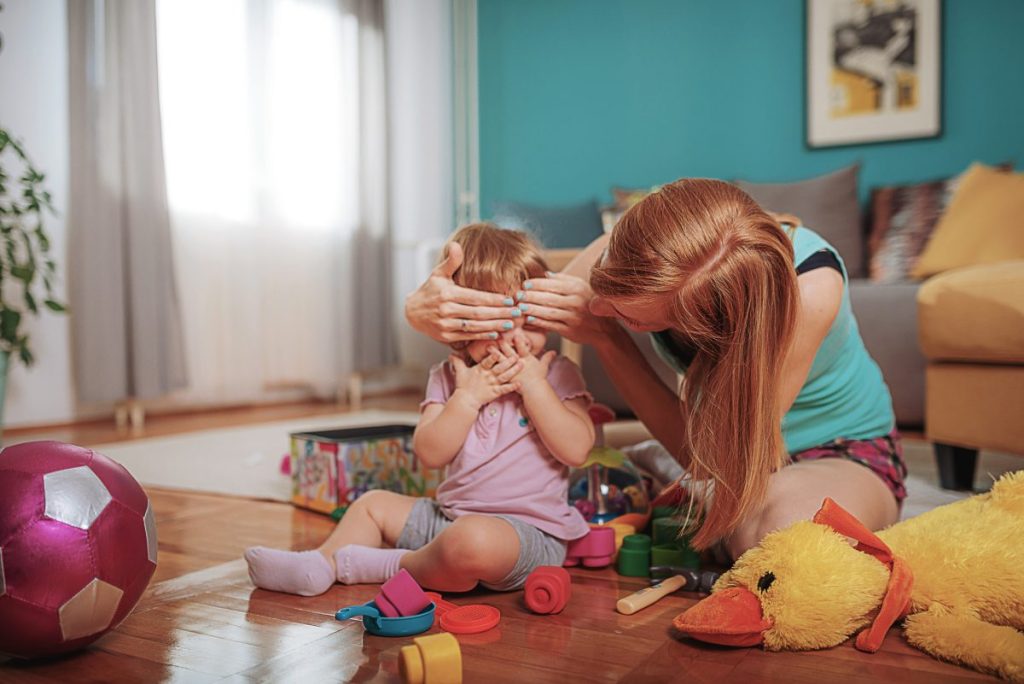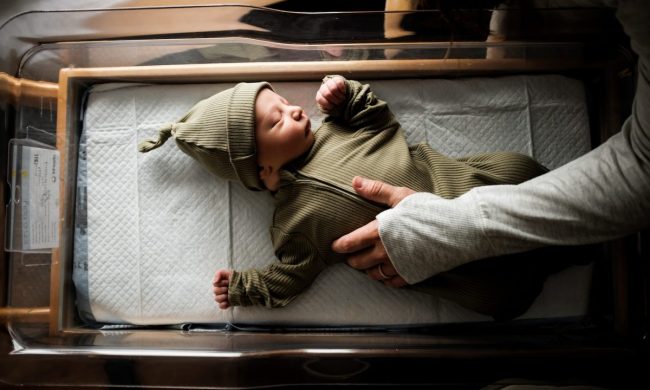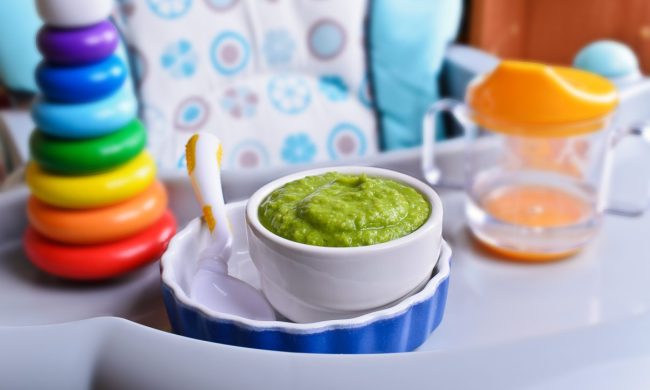Playing peekaboo with any baby is almost a rite of passage. It’s one of those adorable baby games that seems natural to play whenever a baby is present because everyone enjoys playing it. Babies are delighted by watching their parents or other adults excitedly reveal their faces. Your grandparents played it with your parents, your parents played it with you, and now you’re playing it with your child. But what’s the deal with the peekaboo baby game? Why do babies love this simple game?
Could it be that during a game of peekaboo, baby brains undergo some important developmental process? If you’ve read any literature on infant development, you could guess that, yes, peekaboo definitely plays a role in your child’s development. Here’s everything you need to know about this game and why you should play it with your mini-human.
When do babies play peekaboo?

Babies play peekaboo during most stages of infancy — and they should. At every stage along the way, playing peekaboo is helping your infant develop in some way.
During the first few months, playing peekaboo is a way of bonding with your child. They might not respond much. You might get a smile out of them (or maybe some crying) depending on your baby’s nature — but they’re still learning and watching.
Just remember, newborns don’t quite understand object permanence yet, so the game may scare them at first. If you realize that they’re becoming distressed every time you “disappear” or become startled when you say the final “boo,” scale back how often or intensely you are playing the game.
Around 6 months, peekaboo helps your baby learn visual tracking and object permanence. They’re starting to understand that just because your face is hidden, it doesn’t mean that you’re gone. They’re starting to comprehend that you’re still there and this is a fun game.
Around 9 months, your baby might start to play along. They understand this is a social interaction, and they’ll start mimicking you. They’re learning not only how to actively interact with you, but also how to use their motor skills to do so.
What does playing peekaboo teach my baby?

Beyond teaching your baby important skills like visual tracking, object permanence, and motor skills, playing peekaboo helps babies learn to socially engage with others (such as the other player). Your little one will learn social skills like taking turns, especially if they’ve reached the stage where they’re actively playing along and you swap off who’s “hiding” during the game.
Beyond this, peekaboo teaches older children social skills – like engagement and taking turns – if they play the game with a younger sibling. If you have an older toddler or young adolescent that you think wouldn’t be interested in a game of peekaboo, see if they’ll play with their younger sibling. Both will benefit from the interaction, and someone else can play for a minute while you grab a coffee.
Peekaboo can help with language development

Another way peekaboo can benefit your child is by encouraging language development. Children begin recognizing repeated words and actions as young as three months old, making peekaboo the perfect game to help stimulate your child’s brain. The repetition of the phrase as well as the constant hiding and reveal of the face lets your baby anticipate what will come next. You may even notice your baby trying to repeat the word ‘peekaboo’ as you play the game.
You’re also teaching your child about back-and-forth conversations. Experts note that because peekaboo is all about “listening, anticipating and reacting to another person,” playing this fun and simple game with your baby “can help them to learn the basic rhythms of conversation and practice their listening skills.”
Is there any way to change up the game?

After one too many times playing peekaboo, you’re probably a bit bored. While repetition is great for growing and developing minds, there are only so many times a parent can play peekaboo, read the same book, watch the same movies, and listen to the same songs before they’re ready to retire from this parenthood thing for good.
Both for your sanity and to give your baby a little variety, try to mix things up a bit the next time you play peekaboo. Rather than being the one who disappears, play peekaboo with your child’s favorite stuffed animal, hiding it under a blanket or behind your back. Try hiding in other parts of the room, use a blanket to cover you, change your voice, or have multiple family members play at once.
What comes after peekaboo?

Once your child is around a year old and entering the toddler phase, you may find that they’re not quite so keen on peekaboo as they once were. In this case, introduce a new game to keep their interest and help them continue their development. Pattycake is a good one, as it helps them to learn hand-eye coordination and further fine-tune those motor skills.
Can you imagine making your way through the world without motor skills or object permanence? These skills are vital for your child’s survival. Luckily, they’re not at all difficult to teach. Simple games and interactions like peekaboo and patty cake make a big impact on your child’s mental and physical development.
So, even if your little one doesn’t know they have hands yet, make sure peekaboo is a small part of their day, every day. Whether every time you wake them up or after lunchtime, take a minute to play peekaboo. Your precious peanut will get a kick out of it as they get older, and it will create a cute bonding time for the two of you.



